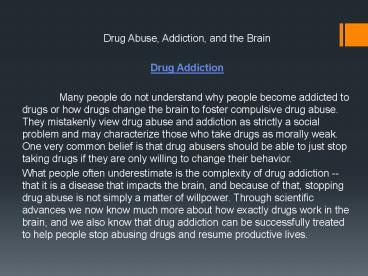Drug Drug Abuse Abuse
Title:
Drug Drug Abuse Abuse
Description:
drug abuse is the use of a prescription medication in a way not intended by the prescribing doctor, such as for the feelings you get from the drug. Prescription drug abuse or problematic use includes everything from taking a friend's prescription painkiller for your backache to snorting or injecting ground-up pills to get high. Drug abuse may become ongoing and compulsive, despite the negative consequences. – PowerPoint PPT presentation
Number of Views:198
Title: Drug Drug Abuse Abuse
1
- Drug Abuse, Addiction, and the Brain
- Drug Addiction
- Many people do not understand why people become
addicted to drugs or how drugs change the brain
to foster compulsive drug abuse. They mistakenly
view drug abuse and addiction as strictly a
social problem and may characterize those who
take drugs as morally weak. One very common
belief is that drug abusers should be able to
just stop taking drugs if they are only willing
to change their behavior. - What people often underestimate is the complexity
of drug addiction -- that it is a disease that
impacts the brain, and because of that, stopping
drug abuse is not simply a matter of willpower.
Through scientific advances we now know much more
about how exactly drugs work in the brain, and we
also know that drug addiction can be successfully
treated to help people stop abusing drugs and
resume productive lives.
2
What Is Drug Addiction?Drug addiction is a
chronic, often relapsing brain disease that
causes compulsive drug seeking and use, despite
harmful consequences to the drug addict and those
around them. Drug addiction is a brain disease
because the abuse of drugs leads to changes in
the structure and function of the brain. Although
it is true that for most people the initial
decision to take drugs is voluntary, over time
the changes in the brain caused by repeated drug
abuse can affect a person's self-control and
ability to make sound decisions, and at the same
time create an intense impulse to take drugs.It
is because of these changes in the brain that it
is so challenging for a person who is addicted to
stop abusing drugs. Fortunately, there are
treatments that help people to counteract
addiction's powerful disruptive effects and
regain control. Research shows that combining
addiction treatment medications, if available,
with behavioral therapy is the best way to ensure
success for most patients. Treatment approaches
that are tailored to each patient's drug abuse
patterns and any concurrent medical, psychiatric,
and social problems can lead to sustained
recovery and a life without drugs.As with other
chronic diseases, such as diabetes, asthma, or
heart disease, drug addiction can be managed
effectively. Yet, it is not uncommon for a person
to relapse and begin abusing drugs again. Relapse
does not signal failure rather, it indicates
that treatment should be reinstated or adjusted,
or that alternate treatment is needed to help the
person regain control and recover.http//www.web
md.com/mental-health/addiction/drug-abuse-addictio
n































